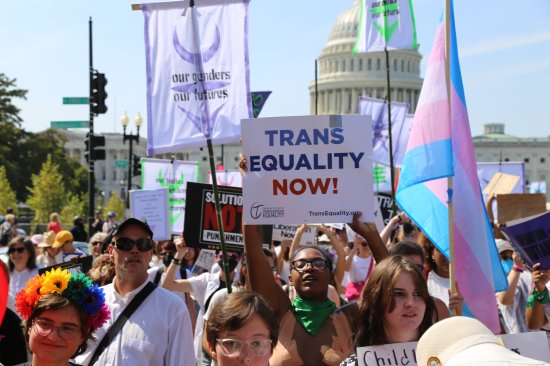
Attendees at the Gender Liberation March in Washington, D.C. talk about the link between fighting for abortion rights and transgender rights.
For Lizette Trujillo, there were multiple reasons it was worth making the 2,000 mile-trip from Tucson, Ariz. to the nation’s capital for the Gender Liberation March to fight for bodily autonomy.
“It’s really important because, yes, I’m the mother of a transgender child, but I [also] had an abortion at 22, had a miscarriage at 40. Having bodily autonomy and access to care that is widely necessary for you is really, really important,” says Trujillo, 44. “And the thought of my child, my son, not having access to the care that’s necessary for him, is something that is terrifying.”
[time-brightcove not-tgx=”true”]Trujillo is one of some 2,000 people who gathered in Washington, D.C. on Saturday in a march uniting activists for both abortion rights and transgender rights. The march comes as more than 650 anti-trans bills have been introduced across local legislatures in 2024, according to the trans legislation tracker, and amid a recorded rise in anti-LGBTQ+ hate crimes. At the same time, abortion rights have been curtailed in multiple states since the overturning of Roe v. Wade in 2022. Some 14 states currently have a total abortion ban in place, and the issue is set to be on the ballot in 10 states come November.
“Our abortion stories and our trans stories are connected and intertwined. We cannot liberate abortion without trans justice,” Renee Bracey Sherman, executive director of We Testify, a nonprofit that shares abortion stories, said in a speech Saturday.
For the organizers of the march, linking the two issues was an intentional strategy. “The idea was to bring together the energy stoked in the fight for abortion access and reproductive justice after the Dobbs [v. Jackson Women’s Health] decision, and also the energy put into fighting for queer and trans folks who are facing attacks on access to health care,” Raquel Willis, a transgender activist and co-organizer of the march, told TIME in an interview ahead of the march. Eliel Cruz, a co-organizer, argues limiting access to abortion and gender-affirming care are part of a larger connected push to reinforce gender binaries and discriminate against people based on their identity.
That connection is already on the path to being codified in the courts. “Both the government and the other entities that are defending government restrictions on medical care are using, in this moment, Dobbs in particular… to justify attacks on gender-affirming medical care, and then use an expansive reading of the Court’s decision in Dobbs in order to open the door to more restrictions on bodily autonomy more generally,” says Chase Strangio, Deputy Director for Transgender Justice at the ACLU’s LGBT & HIV Project. Strangio will argue before the Supreme Court this fall in one such case: U.S. v. Skrmetti, which concerns a Tennessee law barring access to gender-affirming care for transgender youth.
Daniel Trujillo, Lizette’s 17-year-old son and the organizer behind the Trans Youth Prom, says at the march Saturday that he’s excited to reunite with other trans teens and families. But he’s also fearful of what the upcoming Supreme Court case could mean for him; he and his mom are involved in an ACLU awareness campaign launched ahead of the case. “It makes it scary when it comes to trying to think about my college, things that are just in the near future,” he says. “What does that all look like?”
With this national backdrop, the march felt like a safe space for some and an opportunity to rally with people who accept their existence. Jair Codines, a 28-year-old resident of North Carolina who recently started their transition, says that they traveled to Washington, D.C. to fight for their ability to continue that transition. “I will always fight for justice, for the truth, and for our rights,” Codines, who arrived at the march with a group of 20 mostly Latina women, says in Spanish.
At the march, attendees mingled in designated areas for trans youth to gather and perused tents handing out banned books. Hundreds—if not more—of pride and trans flags were drawn on posters, banners, pins, and t-shirts. Trujillo’s spouse painted a scene of iconic transgender figureheads—Cecilia Gentili, Nex Benedict, Monica Roberts, and Lorena Borjas—positioned next to the center stage to honor the activists that came before this generation. “Trans rights are human rights,” marchers clad in white chanted as they walked near the Supreme Court and the headquarters of the Heritage Foundation. “Liberation for my sister, liberation for my brother.” The all white outfits were an homage to previous protests against anti-Black violence such as the 1917 NAACP Silent parade, and Saturday’s marchers also wore purple, pink, and white flower crowns as a callback to transgender-rights advocate Marsha P. Johnson.
The mood of the day was determined yet optimistic. “This is another glimpse into the future,” says Daniel Trujillo. “We’re all going to live and be celebrated and thrive together in public life and schools and bathrooms and our homes safely.”